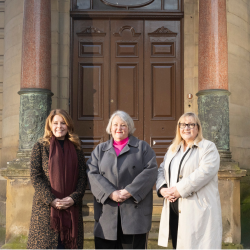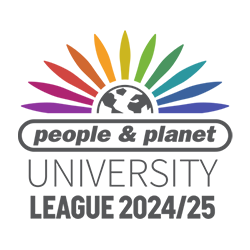-
Study
-
Undergraduate
- Search for a Course
- Undergraduate Open Day & Events
- Application Guides
- Northumbria University UCAS Exhibitions
- Foundation Years
- Undergraduate Fees & Funding
- School & College Outreach
- Continuing Professional Development
-
Postgraduate
- Postgraduate Study Degree
- Postgraduate Research Degrees
- Postgraduate Open Days and Events
- Postgraduate Fees & Funding
- Flexible Learning
- Thinking about a Masters?
- Continuing Professional Development
- Change Direction
-
Student Life
- The Hub - Student Blog
- Accommodation
- Life in Newcastle
- Support for Students
- Careers
- Information for Parents
- Students' Union
- Northumbria Sport
- Be Part of It
-
-
International
International
Northumbria’s global footprint touches every continent across the world, through our global partnerships across 17 institutions in 10 countries, to our 277,000 strong alumni community and 150 recruitment partners – we prepare our students for the challenges of tomorrow. Discover more about how to join Northumbria’s global family or our partnerships.
View our Global Footprint-
Applying to Northumbria
- European Union
- Our London Campus
- Northumbria Pathway
- International Events
- Entry Requirement and Education Country Agents
- Global Offices
-
Northumbria Language Centre
- Faculty Requirements
- Acceptable English Requirements
- Pre-sessional English Language and Study Skills
- Academic Language Skills Programmes (ALS)
-
International Fees, Funding & Scholarships
- International Undergraduate Fees
- International Undergraduate Funding
- International Masters Fees
- International Masters Funding
- International Postgraduate Research Fees
- International Postgraduate Research Funding
- International Money Matters
-
Life at Northumbria
- International student support
- Careers
-
International Mobility
- Current Northumbria Students
- Incoming Exchange Students
-
-
Business
Business
The world is changing faster than ever before. The future is there to be won by organisations who find ways to turn today's possibilities into tomorrows competitive edge. In a connected world, collaboration can be the key to success.
More on our Business Services -
Research
Research
Northumbria is a research-rich, business-focused, professional university with a global reputation for academic quality. We conduct ground-breaking research that is responsive to the science & technology, health & well being, economic and social and arts & cultural needs for the communities
Discover more about our Research -
About Us
-
About Northumbria
- Our Strategy
- Our Staff
- Place and Partnerships
- Student Profiles
- Alumni Profiles
- Leadership & Governance
- Academic Departments
- University Services
- History of Northumbria
- Contact us
- Online Shop
-
-
Alumni
Alumni
Northumbria University is renowned for the calibre of its business-ready graduates. Our alumni network has over 246,000 graduates based in 178 countries worldwide in a range of sectors, our alumni are making a real impact on the world.
Our Alumni - Work For Us
What will I learn on this module?
This module will encourage you to explore some of the ways education has been shaped by history, culture, politics and values. Commencing with an exploration of the purpose and scope of education, you will be supported in challenging your own educational assumptions through an analysis of your identity as practitioners. Western educational practices as shaped by history and philosophy will be examined and this will allow for an uncovering of the contextual issues which affect educational projects. International perspectives will be considered in regard to Islamic education as well as Faith and Secular approaches to education and teacher identity. Political influences in education will be critiqued through exploring the current National Curriculum as well as the Teachers’ Standards 2013 and these will be explored through a political analysis of other nation state approaches to the educational enterprise. The latter part of the module will focus on the types of knowledge and skills valued in education from historical periods and contemporary contexts and how this franchises/disenfranchises the educator and learner. You will be actively engaged with analysing the way in which your practice is shaped and influenced by political agenda and your role as educators will be scrutinised through self-analysis and the presentation of your individual analysis in the form of a short presentation and reflective commentary.
How will I learn on this module?
The module will be built around a number of individual and group learning activities that will help you to explore the different aspects of education from a global, local, historical and contemporary perspective. You will work with the module lead and specialists for the duration of your study. With one to one support you will be enabled to explore areas of the topic that are contested. Critical appraisal will enable you to develop your understanding of the theoretical, historical and pedagogical aspects of your study path. You will be encouraged to attend and engage with a series of seminars that will follow the path of your studies during the span of your programme. Your peer group is seen to be invaluable to the social learning processes that drive this module. During each seminar, it is expected that individuals will share their study challenges and successes. The sharing of understanding and experiences will be an integral part of the way in which the module helps to socially construct individual’s perceptions of their work. The module aims to enable you to develop an effective and successful research study which you will present to your peer group contributing to 50% of the assignment mark and will be supported by a written reflection detailing your emerging knowledge and appraisal of education as an active practitioner also contributing to 50% of your overall mark.
How will I be supported academically on this module?
How will I be supported academically on this module? (SRS 0003) You will work closely with the module lead throughout the module in the form of small group tutorials and 1:1 personal support in discussing material, identifying research areas and constructing the assignment and written reflective component. As the module progresses, students will be signposted to essential reading and materials which will inform seminars and direct input. Correspondence through email and VLE will be used throughout to enhance and inform the learning encounters. Students will be encouraged to engage with social media in following educational advances and aspects, which inform practice and policy. All taught sessions will be made available after delivery through Panopto and additional materials will be presented which will enhance student learning and participation. These ‘extra materials’ are not compulsory or used to inform the main input but will improve student experience and participation.
What will I be expected to read on this module?
All modules at Northumbria include a range of reading materials that students are expected to engage with. Online reading lists (provided after enrolment) give you access to your reading material for your modules. The Library works in partnership with your module tutors to ensure you have access to the material that you need.
What will I be expected to achieve?
Knowledge & Understanding:
1. Develop a critical understand the breadth and complexity of the development of education and its link to political and cultural projects
2. Know that concepts of education vary between contexts
Intellectual / Professional skills & abilities:
1. Critically explore and analyse and the underpinning assumptions and practises
2. An ability to critique sources with rigour and consistency
Personal Values Attributes (Global / Cultural awareness, Ethics, Curiosity) (PVA):
1. Enhanced their your communication skills through your summative written work your presentation and formative discussions
2. Developed your research skills through the preparation for your presentation and summative assignment
3. Enhanced your critical reflection skills via your summative assignment
How will I be assessed?
Formative Assessment:
Formative assessment will take place via group tasks and discussions throughout the module
Feedback:
Feedback will be verbal by both tutor and peers.
Summative Assessment:
Summative assessment will be in two parts, each carrying equal weighting of 50%.
Part 1:
A 20-minute peer observed presentation on an aspect of educational practice, policy or development which challenges your own approach and philosophy (2,500 words)
MLOs: KU1 & 2; IPSA 1; PVA1 & 2
Feedback:
Written and graded feedback against the criteria will be given by the tutor.
Part 2:
Write a reflection on your own practice which contextualises your practice in a historical, political, cultural and value informed professional activity (2500 words)
KU 1 & 2; IPSA1 & 2; PVA 1, 2 & 3.
Pre-requisite(s)
None
Co-requisite(s)
None
Module abstract
Perspectives and Philosophies of Education will challenge you to examine the legitimacy of educational practices and philosophies within which you are professionally active. You will explore the development of approaches to education as a cultural expression of history, philosophy and politics. This will be through an analysis of approaches within the western liberal tradition as well as through educational approaches globally. Values will be assessed alongside the value placed on certain approaches and subjects in state education and beyond. You will engage with other students to critically challenge one another’s philosophies in an encouraging and supportive manner. By the end of the module, you will have used scholarly and professional skills to identify and interrogate your own and others’ practice against the course materials and your own educational journey and philosophy. This will enable you to be a more critically aware and informed educator whose philosophy and practice will be enhanced through rigorous analysis
Course info
Credits 30
Level of Study Postgraduate
Mode of Study 20 months Full Time
2 other options available
Location Coach Lane Campus, Northumbria University
City Newcastle
All information is accurate at the time of sharing.
Full time Courses are primarily delivered via on-campus face to face learning but could include elements of online learning. Most courses run as planned and as promoted on our website and via our marketing materials, but if there are any substantial changes (as determined by the Competition and Markets Authority) to a course or there is the potential that course may be withdrawn, we will notify all affected applicants as soon as possible with advice and guidance regarding their options. It is also important to be aware that optional modules listed on course pages may be subject to change depending on uptake numbers each year.
Contact time is subject to increase or decrease in line with possible restrictions imposed by the government or the University in the interest of maintaining the health and safety and wellbeing of students, staff, and visitors if this is deemed necessary in future.
Useful Links
Find out about our distinctive approach at
www.northumbria.ac.uk/exp
Admissions Terms and Conditions
northumbria.ac.uk/terms
Fees and Funding
northumbria.ac.uk/fees
Admissions Policy
northumbria.ac.uk/adpolicy
Admissions Complaints Policy
northumbria.ac.uk/complaints














